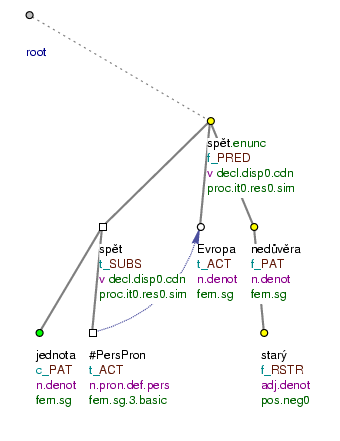The prepositions kromě (=except/besides), mimo (=beyond/except), vedle (=alongside), místo (=instead), namísto (=in place) are exceptional in that they are not necessarily followed by a noun in the requisite case; they can be followed by a further prepositional phrase or a noun in a case other than that required by the preposition; for example:
Kromě dosavadních úkolů bude tento úřad vydávat licence pro podnikání na dráze. (=Besides its previous roles.GEN, this office will issue licences for enterprises on the railway.)
Kromě do Říma, jeli i do Benátek. (=Besides Rome (lit. to Rome), they went to Venice as well.)
Cases in which the prepositions kromě (=except/besides), mimo (=instead), vedle (=alongside), místo (=instead), namísto (=in place) are followed by a further prepositional phrase or a noun in a case other than that required by the preposition are represented as an ellipsis of the verb. Cf.:
-
Místo k jednotě by Evropa spěla ke staré nedůvěře. (=Instead of unity (lit. towards unity), Europe would incline towards the old mistrust.)
= Místo toho, aby spěla k jednotě, by Evropa spěla ke staré nedůvěře. (=Instead of inclining towards unity, Europe would incline towards the old mistrust.)
The clause acquires a new node for the verb; it will usually be a copy of the node representing the verb in the governing clause. The effective root node of the prepositional phrase following the preposition místo (=instead) (k jednotě (=towards unity)) will be the dependent node of this inserted node for the verb. Cf. Fig. 8.294.
The reason for inserting a new node for the verb is the fact that the case form exhibited by the noun (phrase) is not determined by the preceding preposition; thus the case form of the noun is explained only by its being a modification of the elided verb and it also enables the appropriate functor to be assigned to the noun phrase, which would otherwise be covered by the functor RESTR or SUBS.
Figure 8.294. Prepositional phrase following the preposition "místo"

Místo k jednotě by Evropa spěla ke staré nedůvěře. (=lit. Instead towards unity, would Europe incline towards (the) old mistrust.)
On the prepositions kromě (=except/besides),mimo (=except/beyond), vedle (=alongside) see also Section 6, "Constructions signifying "restriction" and "exceptional conjoining"".
!!! Constructions in which the preposition (kromě (=except/besides) , mimo (=except/beyond) , vedle (=alongside)) would be followed by a form other than that required by the preposition do not occur in PDT.
!!! Following the prepositions místo (=instead) and namísto (=in place), ellipsis of the verb is in the majority of cases so far unrepresented in PDT. The functor SUBS is assigned direct to the effective root node of the noun phrase following the preposition.